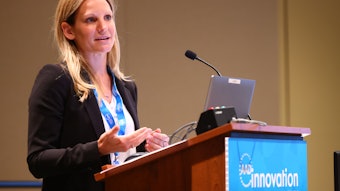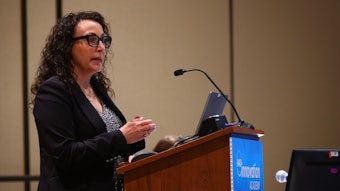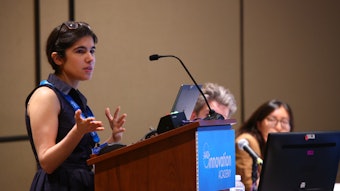Continuing a legacy of progress for patients with skin of color
Kelly Award lecturer shares advancements, advice, and his appreciation for the revered dermatologist.

N001 – Celebrating Excellence: A Duo of Distinguished Talks
Andrew F. Alexis, MD, MPH, FAAD, is this year’s recipient of the A. Paul Kelly, MD, Research Award and Lectureship. Created in 2021, the award recognizes distinguished dermatologists who have dedicated their career to research and advancements that improve care of patients with skin of color.
Dr. Alexis is professor of clinical dermatology and vice chair for diversity and inclusion at Weill Cornell Medicine in New York City. He shared his career highlights, ongoing objectives, and cherished rapport with the late Dr. Kelly in his presentation, “Illuminating the Spectrum of Skin of Color: Clinical Challenges, Therapeutic Advances, and Future Directions” during Friday’s session, N001 – Celebrating Excellence: A Duo of Distinguished Talks.
A legacy of achievement
A large part of Dr. Alexis’s research and practice throughout the last 20 years has been built on Dr. Kelly’s groundwork. Dr. Alexis said some of the most prominent clinical challenges he has observed in patients with skin of color are pigmentary disorders, scarring alopecia, keloids, and multisystem disorders. The key to addressing these challenges, he said during his lecture, is to promote increased research and education related to this set of dermatologic conditions.
“I think that my clinical, research, and educational efforts (made possible through collaboration with so many remarkable dermatology colleagues and organizations, like AAD and SOCS [Skin of Color Society]) have helped advance the care of dermatologic concerns that are prevalent and/or nuanced in patient populations with skin of color,” said Dr. Alexis.
Approaches to treating common disorders in people with skin of color, such as acne, atopic dermatitis, and psoriasis, have evolved as clinical trials have helped to illuminate various aspects. Dr. Alexis said the same is true for research studies that have uncovered therapeutic innovations in disorders that are more prominent in this population, including melasma and central centrifugal cicatricial alopecia (CCCA).
His work also includes improving outcomes for laser and other cosmetic procedures in patients with darker skin types, most notably the use of nonablative fractional lasers in skin phototypes IV–VI.
More than one approach

In his future research, Dr. Alexis said he hopes to contribute to ongoing efforts to advance methods of classifying the diverse spectrum of skin types to improve diagnosis and management.
“While pigmentary alterations are a key driver for patients with skin of color to visit a dermatologist, it is important to identify the underlying cause of the pigmentary change given that the differential diagnosis is broad and can include multisystem disorders, such as sarcoidosis, lupus, or scleroderma, where the dermatologic findings may be the first clue to the diagnosis,” said Dr. Alexis.
A mentor and partner
Looking back at Dr. Kelly’s legacy, Dr. Alexis said it was an honor to have known him and his wife, Beverly, both of whom graciously provided guidance, encouragement, and support at the beginning of and throughout his academic career. The two physicians built their relationship further through opportunities such as co-presenting at AAD meetings, co-chairing an international symposium in Mexico in 2012, and working on the same initiatives.
“Dr. Kelly contributed greatly to my foundation of knowledge on how to manage key issues in patients with skin of color, including keloids, pseudofolliculitis barbae, and acne keloidalis nuchae — topics for which he was an internationally renowned expert,” he said
Dr. Alexis continues to pay it forward by being a mentor to students, residents, and junior faculty whenever he can — and he recommends the rewarding role to other AAD members.
“Seeing so many of my former mentees excel in the field and, in many cases, become renowned experts and leaders in the field, is one of the most rewarding aspects of my work in academic dermatology,” he said.











